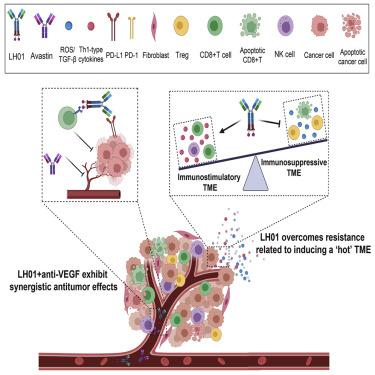Molecular Therapy ( IF 12.1 ) Pub Date : 2022-08-30 , DOI: 10.1016/j.ymthe.2022.08.016 Wenqiang Shi 1 , Liangyin Lv 1 , Nan Liu 2 , Hui Wang 1 , Yang Wang 1 , Wen Zhu 1 , Zexin Liu 1 , Jianwei Zhu 1 , Huili Lu 1

|
Despite the demonstrated immense potential of immune checkpoint inhibitors in various types of cancers, only a minority of patients respond to these therapies. Immunocytokines designed to deliver an immune-activating cytokine directly to the immunosuppressive tumor microenvironment (TME) and block the immune checkpoint simultaneously may provide a strategic advantage over the combination of two single agents. To increase the response rate to checkpoint blockade, in this study, we developed a novel immunocytokine (LH01) composed of the antibody against programmed death-ligand 1 (PD-L1) fused to interleukin (IL)-15 receptor alpha-sushi domain/IL-15 complex. We demonstrate that LH01 efficiently binds mouse or human PD-L1 and maintains IL-15 stimulatory activity. In syngeneic mouse models, LH01 showed improved antitumor efficacy and safety versus anti-PD-L1 plus LH02 (Fc-sushi-IL15) combination and overcame resistance to anti-PD-L1 treatment. Mechanistically, the dual anti-immunosuppressive function of LH01 activated both the innate and adaptive immune responses and induced a favorable and immunostimulatory TME. Furthermore, combination therapy with LH01 and bevacizumab exerts synergistic antitumor effects in an HT29 colorectal xenograft model. Collectively, our results provide supporting evidence that fusion of anti-PD-L1 and IL-15 might be a potent strategy to treat patients with cold tumors or resistance to checkpoint blockade.
中文翻译:

一种新型抗 PD-L1/IL-15 免疫细胞因子克服了对 PD-L1 阻断的耐药性并引发有效的抗肿瘤免疫
尽管免疫检查点抑制剂在各种类型的癌症中显示出巨大的潜力,但只有少数患者对这些疗法有反应。设计用于将免疫激活细胞因子直接递送至免疫抑制肿瘤微环境(TME)并同时阻断免疫检查点的免疫细胞因子可能比两种单一药物的组合具有战略优势。为了提高检查点阻断的反应率,在本研究中,我们开发了一种新型免疫细胞因子(LH01),由与白细胞介素(IL)-15受体α-sushi结构域融合的程序性死亡配体1(PD-L1)抗体组成/ IL-15复合物。我们证明 LH01 有效结合小鼠或人 PD-L1 并维持 IL-15 刺激活性。在同基因小鼠模型中,与抗 PD-L1 加 LH02 (Fc-sushi-IL15) 组合相比,LH01 显示出更高的抗肿瘤功效和安全性,并克服了抗 PD-L1 治疗的耐药性。从机制上讲,LH01 的双重抗免疫抑制功能激活先天性和适应性免疫反应,并诱导有利的免疫刺激性 TME。此外,LH01 和贝伐珠单抗的联合治疗在 HT29 结直肠异种移植模型中发挥协同抗肿瘤作用。总的来说,我们的结果提供了支持证据,表明抗 PD-L1 和 IL-15 的融合可能是治疗冷肿瘤或对检查点封锁耐药的患者的有效策略。












































 京公网安备 11010802027423号
京公网安备 11010802027423号